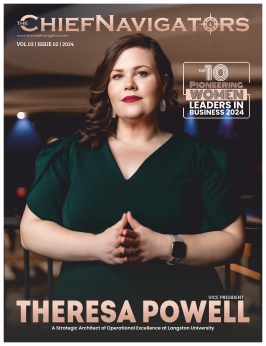Theresa Powell: A Strategic Architect of Operational Excellence at Langston University
Top 10 Pioneering Women Leaders in Business, 2024

In higher education, effective leadership is paramount to driving institutional success and fostering a culture of excellence. At Langston University, Theresa Powell stands as a beacon of leadership, guiding the Operations division with precision and purpose. As the Vice President for Operations, Theresa oversees a diverse portfolio of responsibilities crucial to the university’s mission and strategic objectives.
Theresa’s leadership is defined by her commitment to demonstrating the value of higher education and promoting Langston University’s academic offerings. She instills a sense of purpose within her team, emphasizing the importance of their roles in advancing the university’s mission and strategic priorities. Through regular communication and mentorship, Theresa empowers her team to excel in their respective areas and uphold the institution’s reputation for excellence.
As a champion of her team’s efforts, Theresa’s role extends beyond oversight to fostering a culture of collaboration, innovation, and continuous improvement. She actively recruits talented individuals, removes obstacles impeding progress, and provides unwavering support to ensure collective success in achieving shared goals.
Theresa’s dedication to operational excellence and her unwavering commitment to Langston University’s mission make her a respected leader within the institution and the higher education community at large. Under her guidance, Operations serves as a catalyst for positive change, driving innovation and efficiency.
From First-Gen to Leadership
Theresa’s journey to leadership began in her upbringing in a small Appalachian town, where her hard-working parents instilled in her the value of education and opportunity. Despite being the first in her immediate family to earn a bachelor’s degree, Theresa was encouraged to pursue higher education as a pathway to success. This foundation of hard work and love for learning guided her throughout her career.
During her time at Ohio University, her alma mater, Theresa’s dedication and problem-solving abilities led to her being entrusted with responsibilities beyond typical student employment. This experience paved the way for her transition to a full-time position upon graduation, where she gained invaluable experience across various disciplines within higher education.
Throughout her career, Theresa benefited from the guidance of incredible mentors who recognized her potential and challenged her to grow. This support enabled her to achieve her goal of serving as chief of staff to a university president by the age of thirty. Subsequently, Theresa embraced new opportunities and challenges, ultimately transitioning into a vice presidency role at Langston University, Oklahoma’s only HBCU.
Reflecting on her journey, Theresa emphasizes the importance of embracing discomfort as a catalyst for growth and learning. She recognizes that stepping out of one’s comfort zone is essential for personal and professional development, a lesson she has internalized through her diverse experiences in leadership and higher education.
Aligning Operations with Academic Priorities
At Langston University, Theresa emphasizes the importance of collaboration and alignment among the leadership team to achieve strategic priorities. As a key member of the university’s leadership, Theresa works closely with the vice president for academic affairs, faculty, and department chairs to ensure that operational efforts are in sync with academic goals.
Theresa’s approach involves regular meetings with academic leadership to understand their needs and challenges. Through candid conversations and open communication, she collaborates with her counterparts in academic affairs to address financial, operational, and personnel considerations. This collaborative effort aims to ensure a realistic and successful integration of resources and support for academic initiatives.
By fostering a culture of collaboration and transparency, Theresa and her team facilitate effective alignment between operations and academic affairs, ultimately supporting Langston University’s mission and strategic objectives.
Entrepreneurial Approach to Transforming Operations
Since her appointment as vice president for operations in March 2021, Theresa has approached the formation of her division with an entrepreneurial mindset, treating it like a start-up. Recognizing the importance of leveraging technology to streamline processes and improve efficiency, Theresa and her team have implemented innovative solutions to enhance their operations.
One significant improvement has been the implementation of an online workflow for facilities, which has transformed their work processes. Through the creation of training resources, Theresa ensures that employees and students fully utilize this tool, resulting in a significant decrease in open work orders from an average of two months to just four days. Additionally, they leverage the technology to track patterns and anticipate mechanical failures, enabling proactive maintenance and resource allocation.
In the field of public relations, Theresa’s team utilizes a similar system to manage requests for news stories, press releases, and event promotion, maintaining a historical record of initiatives and promotions. Furthermore, they leverage technology in storytelling through social media strategies, videos, podcasts, and website redesign, effectively communicating the university’s vision to its stakeholders.
Moreover, Theresa recognizes the importance of technology in strategic enrollment processes, leading the implementation of the institution’s first-ever customer relationship management software (CRM). Drawing from her previous experience in admissions and enrollment, Theresa understands the CRM’s potential to address communication gaps and provide employees with the necessary information to better serve students and their families.
Through her innovative approach and strategic use of technology, Theresa is driving positive change and enhancing efficiency across operations at Langston University. Her focus on data-driven decision-making and continuous improvement reflects her commitment to advancing the institution’s mission and achieving its strategic goals.
Adapting for Success
Theresa highlights the transformative changes implemented at Langston University in response to lessons learned during the pandemic. Recognizing the importance of streamlining student services, the university introduced more remote opportunities for students to connect with staff in admissions and financial aid, ensuring convenient and timely assistance. Additionally, the public relations team collaborates closely with all departments to promote available resources through social media and news stories, enhancing accessibility for students.
Listening closely to student and family needs, Langston University restructured its academic semester calendar to end before the Thanksgiving holiday, reducing transportation costs and providing a longer winter break. This adjustment has been met with overwhelmingly positive feedback, demonstrating the university’s responsiveness to its community.
Furthermore, significant infrastructure investments have been made across all campuses, including a state-of-the-art healthcare education facility in Tulsa and a renovated news studio campus in Oklahoma City. On the Langston campus, student housing has been renovated, mechanical deficiencies addressed, and the Student Success Center transformed into a modern, dynamic space. The renovation of the cafeteria into a food-court style dining environment, along with the installation of a dynamic history wall, reflects the university’s commitment to honoring its legacy while embracing the future.
These initiatives reflect Langston University’s dedication to enhancing the student experience, fostering innovation, and preparing for the future. Through strategic investments and responsive decision-making, Theresa and her team are positioning the institution for continued success and growth.
Building Connections
Theresa applies the power of collaboration across the entire Langston University community. As a small institution with multiple campuses and an instructional site across Oklahoma, fostering strong connections and communication is essential. Theresa’s division, Operations, works diligently to build and maintain relationships with colleagues across all campuses to ensure shared goals are achieved.
Despite being the newest division at the institution, Operations collaborates extensively with all departments to propel Langston University forward. Recruiters proudly represent the university, sharing details of academic programs and collaborating with financial aid to showcase the value of a Langston education to prospective students and their families. The public relations team amplifies positive news from students, faculty, and staff, contributing to a positive institutional image.
Operations actively engages with alumni and community members through partnership opportunities aimed at highlighting alumni achievements and events. By leveraging these partnerships, Langston University strengthens its ties with its alumni base and local community, further enhancing its impact and reach.
Through effective collaboration, communication, and teambuilding efforts, Theresa and her team contribute significantly to Langston University’s continued growth and success. Their dedication to fostering strong relationships and partnerships underscores the institution’s commitment to excellence and advancement.
Personalized Coaching Approach
Theresa places a strong emphasis on teambuilding and cross-training at Langston University, recognizing the value it brings to employee development and organizational success. By fostering a deeper appreciation for each team member’s unique strengths and learning styles, She ensures that coaching and professional development opportunities are tailored to individual needs and goals.
This inspiring leader’s coaching approach is personalized, taking into account the specific aspirations and learning preferences of each direct report. Rather than applying a one-size-fits-all approach, Theresa meets employees where they are and offers opportunities that align with their growth objectives. For example, when a team member expressed interest in improving crisis response skills, Theresa exposed them to her work in risk management and facilitated experiences that helped develop effective responses to media inquiries.
At Langston University, employees have the opportunity to gain experience in various administrative and operational processes, fostering curiosity and a willingness to learn. Through collaboration and cross-training initiatives, Theresa encourages employees to explore different areas of the institution, contributing to their professional growth and adaptability.
This commitment to individualized coaching, coupled with a culture of collaboration and continuous learning, empowers employees to thrive and contribute effectively to Langston University’s mission and objectives.
Dedication to Service and Collaboration
Langston University’s close relationship with its surrounding rural community is deeply ingrained in its mission and values. Through collaborative initiatives and services, the university actively engages with the community to address local needs and promote mutual prosperity.
One such example is the management of a food pantry by the division of student affairs, which not only serves the campus but also extends its reach to the surrounding communities in the county. This partnership exemplifies Langston University’s commitment to supporting the well-being of its neighbors and fostering a sense of unity and support.
As an 1890 land-grant institution, Langston University leverages its extension and outreach activities to positively impact communities throughout the state. Through these efforts, the university serves as a catalyst for positive change and development, empowering individuals and communities to thrive.
Langston University operates as a responsible steward of institutional resources, extending its efforts to benefit the wider community. The division of operations plays a crucial role in maintaining the aesthetic appeal of the campus, contributing to the enhancement of the immediate environment and the overall well-being of the community.
Through ongoing communication and collaboration with the surrounding community, Langston University demonstrates its dedication to advancing shared goals and fostering a harmonious and supportive relationship. As a result, the university serves as a beacon of hope and opportunity, making a meaningful impact on the lives of those it serves.
Vision for Langston University’s Future
As vice president, Theresa is committed to ensuring Langston University has realistic long-range plans with achievable goals, with a particular focus on enhancing the institution’s resilience. One project that stands out is the development of the university’s first-ever campus master plan, which has been shaped through collaboration with institutional and community stakeholders.
Theresa’s division, Operations, plays a crucial role in the campus master plan project, contributing to capital planning, facilities management, enrollment capacity planning, and storytelling efforts led by the public relations and alumni affairs teams. This multidisciplinary approach ensures that the project moves forward successfully and aligns with Langston University’s vision for the future.
Theresa’s overarching vision for the division of operations and Langston University is to move beyond efficiency to resiliency. This involves building capacity through personnel and partnerships to support the university’s mission and continuously enhance the student experience at Oklahoma’s only Historically Black College and University (HBCU).
By prioritizing realistic long-range planning, fostering collaboration across departments and with external stakeholders, and focusing on building resilience, Theresa aims to position Langston University for sustained success and positive impact in the years to come.
Website: langston.edu



